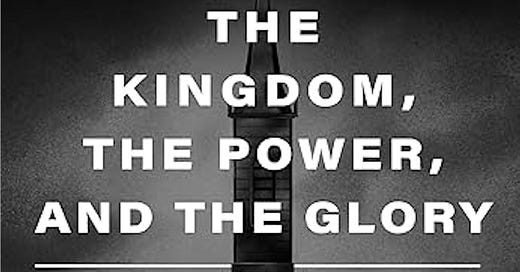Protestant Deformation
My review of Tim Alberta's The Kingdom, the Power, and the Glory
I’m delighted to make my Claremont Review of Books debut in the Spring 2024 issue with a review of Atlantic reporter Tim Alberta’s New York Times bestseller The Kingdom, the Power, and the Glory: American Evangelicals in an Age of Extremism.
While this book is deeply hostile to Trump supporting evangelicals, the critiques Alberta levels can’t just be dismissed. There are real problems in evangelicalism that need to be addressed. I write:
The Kingdom, the Power, and the Glory relates numerous stories of pro-Trump evangelicals behaving badly. Alberta investigates Liberty University and its former president Jerry Falwell, Jr., who operated the school like a dictatorship while engaging in dubious personal behavior. He attends an event put on by the Faith and Freedom Coalition, where speakers include Trump spiritual advisor and prosperity gospel preacher Paula White—viewed by many evangelicals as a heretic—and another person who promotes the QAnon conspiracy theory. Alberta visits the American Restoration Tour, a hybrid revival and GOP pep rally designed to convince people that “We’re losing the country.” He covers pastor Bill Bolin at FloodGate Church in Brighton, Michigan, who regularly devotes 15-minute segments of the church service to political rants about COVID-19 and other topics. And he attends the church of pastor Greg Locke, who has called Joe Biden a “sex-trafficking, demon-possessed mongrel” among other colorful phrases.
…
But whatever the defects in the messenger or the message, evangelicals would do well to heed some of Alberta’s criticisms. There are serious and widespread flaws in American evangelicalism. It is dominated by charismatic figures who rule over their organizations like feudal lords. Many are hucksters who exploit their flock or have acquired unseemly levels of wealth for people in their positions. Some promote conspiracy theories. There are more people involved in the prosperity gospel movement and other dodgy corners of Pentecostalism than many evangelicals would like to admit.
On the other side, Alberta is far too laudatory of the Trump critics within evangelicalism. He also confidently explains Christianity to his heavily secular audience as something that is compatible with their views, and which does not necessarily contain anything contrary to it.
In contrast, his portraits of anti-Trump evangelicals like David French and Russell Moore, and others he deems “good guys,” are one-dimensional hagiography. He writes of SBC president Bart Barber, for example, that “[i]t was hard to imagine a more winsome human being.” Of Barber’s predecessor as SBC president, Ed Litton, Alberta tells us that Litton did not run for the customary second term because of “the pressures he felt navigating this denominational civil war.” He fails to mention that Litton was also embroiled in a major plagiarism scandal involving over 100 sermons allegedly copied from others without attribution.
…
Alberta touts himself as an evangelical. He starts each chapter with a quotation from Scripture. He expounds Christian theology, and even explains Greek words used in the New Testament. At one point he confidently states, “When Jesus walked the earth, He went out of His way to minister to the broken and the shunned. He didn’t show mere mercy to the adulterer and the prostitute and the tax collector; he showed favoritism toward them.” He lays out his own theological justification for ordaining female pastors. And much more.
But when it comes to matters like abortion, he doesn’t operate this way. Instead, he describes abortion merely as something that the people he profiles oppose: “If abortion is murder,” he writes, “as pro-life advocates like Phillips believe….” Alberta carefully avoids admitting that Christian doctrine conflicts with any liberal secular elite positions, or that he himself holds any views that conflict with them. His book is crafted to appeal to those elites and confirm them in their pre-existing dislike of conservative evangelicals, positioning their own values as the proper Christian measure for doing so.
The net result is that while Alberta identifies some real problems, his book is not written in a way to actually promote a resolution of them, but rather in one that flatters the sensibilities of hostile secular readers.
Click over to read the whole review.






I've had a run in with Bolin, and there is definitely a huckster problem with evangelicals. Trump really has given those guys new life, especially in a political realm. But, as you imply, so it true of Alberta et al., willing to please the ears of their new crowds for personal gain, be it financial or praise.
I get the sense almost everyone has given up (politically and culturally) and is just looting the ship before she goes down.